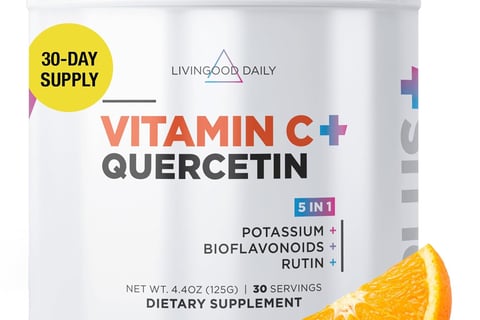
What supplements should I take for overall health: Essential nutrients for optimal wellness
Maintaining optimal health often involves more than just a balanced diet and regular exercise. Many people turn to dietary supplements to fill nutritional gaps and support their wellbeing. While individual needs vary, certain supplements have gained recognition for their potential benefits.
1/24/20257 min read


Maintaining optimal health often involves more than just a balanced diet and regular exercise. Many people turn to dietary supplements to fill nutritional gaps and support their wellbeing. While individual needs vary, certain supplements have gained recognition for their potential benefits.
A multivitamin, omega-3 fatty acids, vitamin D, and probiotics are commonly recommended supplements for overall health. These can help address common deficiencies and support various bodily functions, from immune health to cognitive performance.
It's important to note that supplements are not a substitute for a healthy lifestyle. Consulting with a healthcare professional before starting any new supplement regimen is advisable, as they can assess individual needs and potential interactions with medications.
Understanding Dietary Supplements
Dietary supplements are products designed to complement a person's diet and provide additional nutrients. They come in various forms and serve different purposes, but their safety and regulation are important considerations.
Definition and Purpose
Dietary supplements are products taken orally that contain one or more dietary ingredients. These ingredients may include vitamins, minerals, herbs, amino acids, or other substances. Supplements aim to fill nutritional gaps in a person's diet or provide specific health benefits.
Many people use supplements to support overall health, improve athletic performance, or address specific health concerns. Common reasons for taking supplements include boosting immunity, enhancing energy levels, and promoting heart health.
Types of Supplements
Supplements come in various forms to suit different preferences and needs:
Tablets and capsules
Powders
Liquids
Gummies
Bars
Common types of dietary supplements include:
Multivitamins
Omega-3 fatty acids
Probiotics
Vitamin D
Calcium
Iron
Some supplements target specific health concerns, such as joint health or cognitive function. Others cater to particular demographics, like prenatal vitamins for pregnant women or calcium supplements for older adults.
Regulation and Safety
The U.S. Food and Drug Administration (FDA) regulates dietary supplements differently from conventional foods and drugs. Supplement manufacturers are responsible for ensuring their products are safe before marketing them.
The FDA does not approve dietary supplements for safety and effectiveness before they reach the market. Instead, the agency monitors adverse event reports and can take action if a product is found to be unsafe.
Consumers should be aware that not all supplements are created equal. Quality can vary between brands and products. It's advisable to choose supplements from reputable manufacturers and consult with a healthcare provider before starting any new supplement regimen.
Core Supplements for Overall Health
Certain key supplements can support overall health and wellness when combined with a balanced diet. These core supplements provide essential nutrients that may be lacking in many people's daily food intake.
Multivitamins
Multivitamins offer a broad spectrum of vitamins and minerals in one convenient dose. They help fill nutritional gaps in the diet and support various bodily functions.
Many multivitamins contain B vitamins, vitamin C, vitamin D, and minerals like zinc and selenium. These nutrients play crucial roles in energy production, immune function, and antioxidant protection.
When choosing a multivitamin, look for formulations tailored to age, gender, and specific health needs. Opt for reputable brands that undergo third-party testing for quality and purity.
Omega-3 Fatty Acids
Omega-3 fatty acids are essential fats that provide numerous health benefits. They support heart health, brain function, and may help reduce inflammation in the body.
The two main types of omega-3s are EPA and DHA, found primarily in fatty fish. For those who don't consume enough fish, omega-3 supplements can be beneficial.
Fish oil is a common source of omega-3s, but algae-based supplements are available for vegetarians and vegans. Aim for a supplement that provides at least 250-500 mg of combined EPA and DHA daily.
Probiotics
Probiotics are beneficial bacteria that support gut health and digestive function. They may also boost immune function and help maintain a healthy balance of microorganisms in the body.
Different probiotic strains offer various health benefits. Look for supplements containing well-researched strains like Lactobacillus and Bifidobacterium species.
When selecting a probiotic supplement, choose one with at least 1 billion colony-forming units (CFUs) per serving. Consider products with multiple strains for broader benefits.
Vitamin D
Vitamin D is crucial for bone health, immune function, and overall well-being. Many people don't get enough vitamin D from sunlight exposure and diet alone.
Vitamin D3 is the most effective form for supplementation. The recommended daily intake varies, but 1000-2000 IU is common for adults.
Regular blood tests can help determine individual vitamin D needs. Some people may require higher doses under medical supervision to correct deficiencies.
Additional Supplements for Specific Needs
Certain supplements can address particular health concerns or deficiencies. These targeted supplements may provide benefits for individuals with specific nutritional requirements or health goals.
Antioxidants
Antioxidants help protect cells from damage caused by free radicals. Common antioxidant supplements include vitamins C and E, beta-carotene, and selenium.
Vitamin C supports immune function and collagen production. A typical daily dose ranges from 65 to 90 mg for adults.
Vitamin E acts as a powerful antioxidant in cell membranes. The recommended daily intake is 15 mg for adults.
Beta-carotene converts to vitamin A in the body, supporting eye health and immune function. A common supplemental dose is 6-15 mg daily.
Selenium plays a role in thyroid function and DNA synthesis. Adults typically need 55 mcg per day.
Magnesium
Magnesium is essential for numerous bodily functions, including muscle and nerve function, energy production, and bone health.
The recommended daily intake for adults ranges from 310 to 420 mg, depending on age and gender.
Magnesium supplements come in various forms, such as magnesium citrate, glycinate, and oxide. Citrate and glycinate are generally better absorbed.
Some people may experience digestive side effects from magnesium supplements. Starting with a lower dose and gradually increasing can help minimize this issue.
Calcium
Calcium is crucial for building and maintaining strong bones and teeth. It also supports muscle function and nerve transmission.
The recommended daily intake for adults ranges from 1000 to 1200 mg, depending on age and gender.
Calcium carbonate and calcium citrate are common forms of calcium supplements. Calcium carbonate is best absorbed when taken with food.
Vitamin D is often included in calcium supplements, as it aids in calcium absorption. A typical combination might include 500 mg of calcium with 400-800 IU of vitamin D.
Spreading calcium intake throughout the day can improve absorption. Taking no more than 500 mg at a time is generally recommended.
Factors Influencing Supplementation
Individual needs for dietary supplements vary based on several key factors. These include a person's diet, age, gender, and existing health conditions.
Dietary Considerations
A person's eating habits significantly impact their need for supplements. Those following restrictive diets may require additional nutrients. Vegans and vegetarians often need vitamin B12 supplements, as this vitamin is primarily found in animal products.
Individuals with limited food variety or poor appetites may benefit from multivitamins. People who consume processed foods regularly might need extra fiber and antioxidants.
Seasonal eating patterns can also affect supplement needs. During winter months, some may require vitamin D supplements due to reduced sun exposure.
Age and Gender
Nutritional needs change throughout life stages. Children and adolescents may need extra calcium and vitamin D for bone growth. Women of childbearing age often require folic acid to prevent birth defects.
Older adults might need more vitamin B12, as absorption decreases with age. Postmenopausal women may benefit from calcium and vitamin D supplements to maintain bone density.
Men typically require different supplement amounts than women. For instance, men generally need less iron than premenopausal women.
Health Conditions
Certain medical conditions can affect nutrient absorption or increase nutritional needs. People with celiac disease may require supplements to address deficiencies caused by malabsorption.
Individuals with osteoporosis often need calcium and vitamin D supplements. Those with anemia might require iron supplementation.
Some medications can interfere with nutrient absorption. For example, long-term use of proton pump inhibitors can lead to vitamin B12 deficiency.
Pregnant women have increased nutritional needs and often require prenatal vitamins. People with chronic diseases may need specific supplements to manage their condition or counteract medication side effects.
Choosing the Right Supplements
Selecting appropriate supplements requires careful consideration of quality, individual needs, and professional guidance. These factors help ensure safe and effective supplementation.
Quality and Brand Research
When choosing supplements, look for reputable brands with third-party testing. Check for certifications from organizations like NSF International or USP. These indicate product quality and purity.
Read labels carefully to understand ingredient sources and dosages. Avoid supplements with unnecessary fillers or artificial additives. Natural ingredients are often preferable.
Compare prices, but don't sacrifice quality for cost. Higher-priced supplements may offer better absorption or more bioavailable forms of nutrients.
Customization for Individual Needs
Assess your diet and lifestyle to identify potential nutrient gaps. Age, gender, and health conditions influence supplement requirements.
Consider your specific health goals. Athletes may need different supplements than those focusing on heart health or bone density.
Start with essential nutrients like vitamin D, omega-3 fatty acids, and a multivitamin. Add targeted supplements based on personal needs.
Be aware of potential interactions between supplements and medications. Some combinations can be harmful or reduce effectiveness.
Consulting Healthcare Professionals
Speak with a doctor or registered dietitian before starting any supplement regimen. They can provide personalized recommendations based on your health status.
Discuss any existing medical conditions or medications. Healthcare providers can identify potential risks or contraindications.
Consider getting blood tests to determine specific nutrient deficiencies. This helps tailor supplementation to your body's needs.
Regular check-ups allow for adjustments to your supplement plan as your health needs change over time.






















Additional info
Social media coming soon!
Contact us
Newsletter coming soon!
© 2024. All rights reserved.
